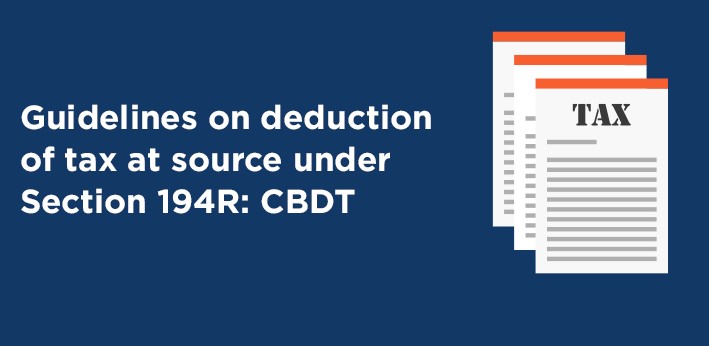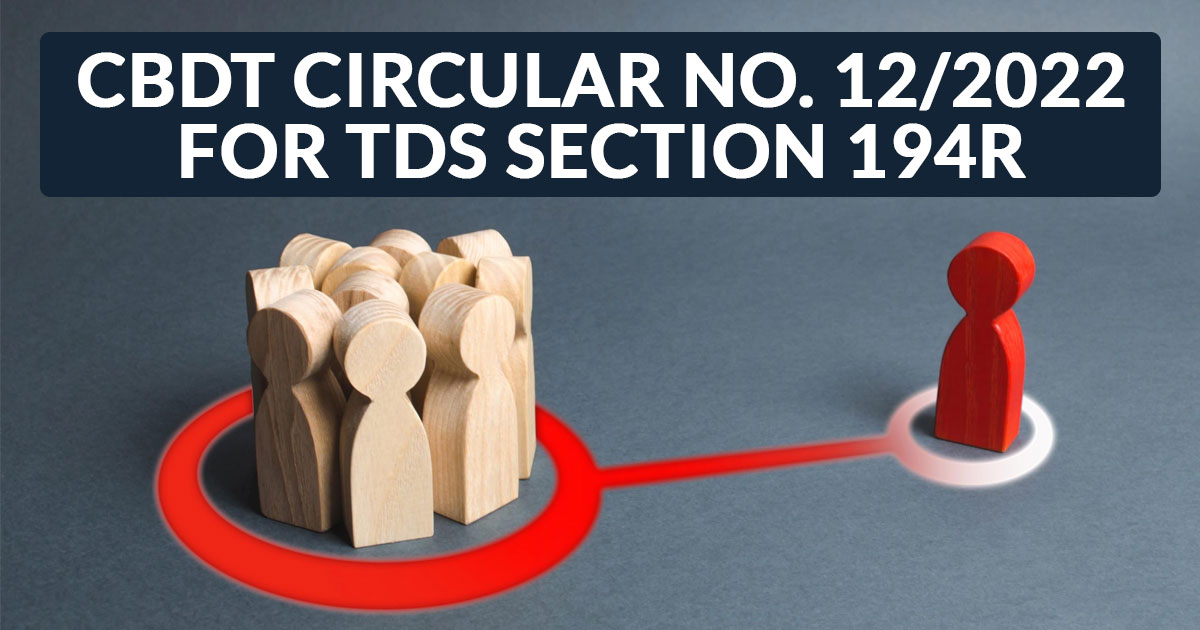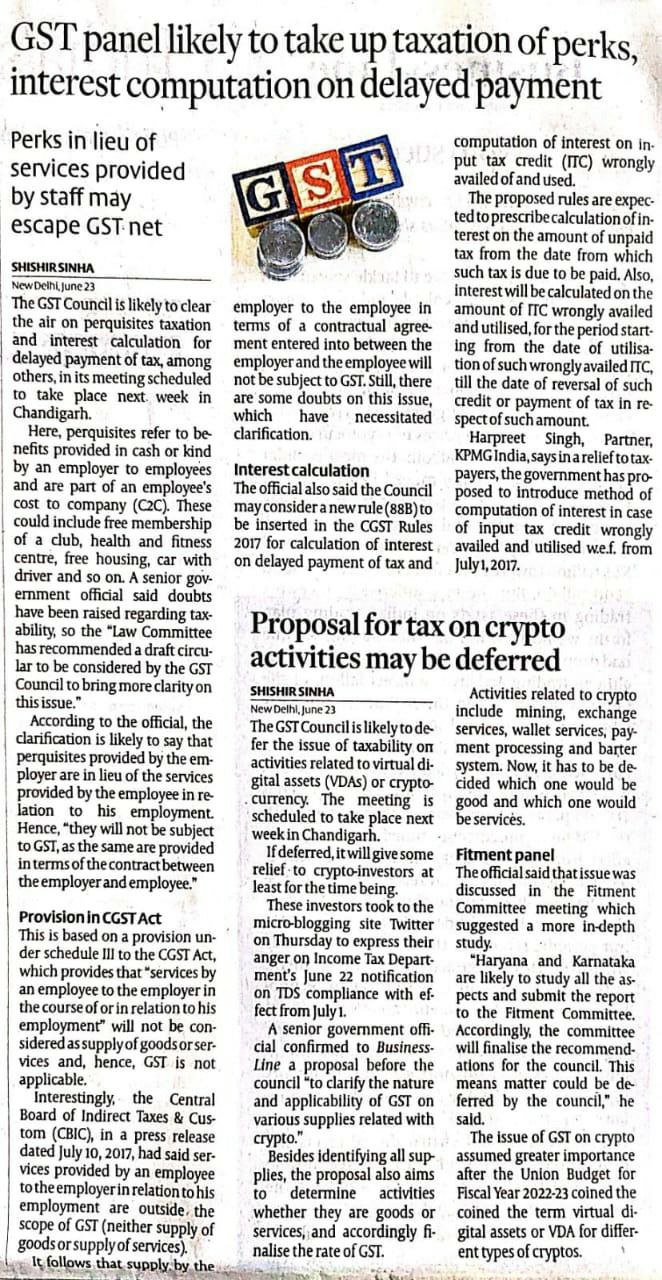TDS on perquisites U/s 194R & its Impact on Business
Page Contents
CBDT Guidelines on applicability of TDS Provision U/s 194R

TDS Rate U/s 194R
- The Finance Act 2022 added a new section in the Income tax Act section 194R. Budget 2022-23 included a new section 194R towards TDS (tax deducted at source) to the Income-tax Act, 1961 with effect from July 1, 2022,.
- The new section compels any person who offers any benefit or perquisite to a resident over Rs.20,000 in a year that originates from the resident’s business or profession to deduct tax at source at a rate of 10%.
- It required that any person who offers any benefit or perquisite to a resident in excess of INR 20,000/- in a Financial Year arising from the resident’s business or profession TDS at a rate of 10%.
Applicable TDS Rate U/s 194R
- As above mentioned stated, the Section 194R compulsory a person, who is liable for giving any kind prerequisite or advantage to a resident, to deduct TDS at a rate of 10% of the value or total of the value of such prerequisite or benefit, before giving such perquisite or benefit.
What are the condition for TDS
- The benefit or perquisite may or may not be converted into money, but it must originate from such resident’s carrying out a business or practising a profession.
- If the value or aggregate of the value of the benefit or perquisite granted or projected to be provided to the resident during the financial year does not exceed Rs.20000, this deduction is not required.
Eligibility Criteria for Tax Deductor
- Individual/ Hindu undivided family deductor whose total sales / gross receipts / gross turnover from business does not exceed 1 crore rupees, or from profession does not exceed 50 lakh rupees, during the financial year immediately preceding the financial year in which such benefit or perquisite is provided by him is also exempt from tax deduction.
Guidelines issued by CBDT on applicability of TDS Provision U/s 194R

- Central Govt department made it clear that Under Section 194R of income tax act will applicable, In case the advantage or perquisite is giving to a govt orginations also, like a government hospital, not carrying profession or on business.
- In other than hospitals, CBDT also give a breather on rebates allowed or cash discounts and sales discounts to clients by excluding them from the Section 194R as their inclusion would put the seller into difficulties.
Perquisites or Benefits on which TDS is needed to be deducted
CBDT guidelines have mentioned below few examples where the TDS is needed to be deducted U/s 194R:
- In case a person provides a free ticket for an event
- When a person gives incentives in cash or kind such as TV, car, computers, gold coin, mobile phone, etc.
- In case a person gives medical practitioners as a medicine samples free
- When a person sponsors a trip for the recipient & his/her relatives upon achieving specified set targets.
But this list as mentioned above is not exhaustive.
If the recipient is not liable to pay TDS on the such Benefits
- According to the Guidance, it is not necessary to determine whether the amount is taxable in the hands of the beneficiary. Even if the beneficiary of the advantages or perquisites does not record such receipt in their income tax return, the TDS provision u/s 194R will apply. Furthermore, if the benefits are taxable, it is not essential to check the provision under which they are taxable in the recipient’s hands.
Is this section apply to advantages or perquisites received in cash or kind?
- The govt further clarified that TDS (Section 194R) must be deducted on benefits or perquisites that are not exclusively in kind.
- The aforementioned provision applies in circumstances where the benefit or perquisite is received in kind, cash, or a combination of both.
- It further states that TDS under section 194R shall apply regardless of the nature of the benefits and perks supplied. It has clarified this by citing several court decisions in which benefits or perquisites like as cars, land, and other capital assets (capital assets) are held to be taxable in the hands of the recipient.
Valuation of the benefit/perquisite
- For valuation reasons, the FMV of the benefit or perquisite granted to the recipient will be applied. If the perquisite is acquired before being given to the recipient, it will be valued at the time of purchase. If a benefit or perk is produced, it must be priced according to the price offered to clients.
Calculation of Section 194R threshold limit
- If the value of the benefit or perquisite during the year exceeds INR 20,000, Income tax Section 194R would be activated (including the period 1-04-2022 to 30-06 2022). Only on benefits or perquisites supplied after July 1, 2022, could the benefits provider deduct TDS under the abovementioned clause.
How to deduct TDS on in-kind benefits?
- If the benefit or perquisite is delivered in kind, the deductor must make certain that the benefit recipient pays advance tax on the value of the benefit.
- Alternatively, under Section 194R, the benefits provider may pay TDS to the government (TDS to be also considered as part of the benefit).
Other circumstances/ reasons have been explained.
Certain other circumstances are explained here under to understand the applicability of TDS
- In case a manufacturing firm provides a social media influencer a product to promote on social media, the product is deemed a benefit or perk if it is not returned.
- Any expenses made by a person in the course of business or profession, if reimbursed by the customer/service receiver, are effectively a benefit/perquisite supplied by the customer/service recipient to the first person.
However, if the service provider/ business pays for the expenses and the service recipient / customer reimburses them, it is not a benefit or perk, as long as the invoice is sent in the service/ customer recipient’s name.
Section 194R Exceptions
According to the demonstrated of the CBDT Guidelines. TDS u/s 194R is not applicable in various cases of sales promotion.
- Customers are eligible for sales discounts, cash discounts, and refunds.
- When a fee or substantial discount is given to the purchase of some units of a product in exchange for the purchase of specific units of the same product (for example, BOGO-buy one receive one).
Consequently, in the case of free samples, the aforesaid provision of no tax deduction does not apply.
Section 194R does not apply if a benefit or perquisite is supplied to a government institution that is not engaged in any business or profession, such as a government hospital.
Expenses for seminars to educate the dealer/business about the product launch, sales strategies, or other comparable topics are not considered a benefit or perk. However, such gatherings should not be viewed as rewards or incentives for chosen dealers or consumers who meet specific goals.
As a consequence, taxpayers will need to identify transactions that are in the type of benefits and perquisites going forward in order to comply with the new TDS condition.
Details Circular mention here under :
CBDT has Issue guidelines to make provisions of section 194R of the Income Tax Act
GST – Important Provisions for ITC Allowance/Non-Payment of Tax on Business Promotion Expenses
- Theses aren’t considered outward supply because they aren’t moved or disposed of for money.
- These are not ‘gifts’as there is a business purpose for the expenditure. The expenditure is incurred to promote/generate sales. They are not voluntary but incurred due to market requirements to generate demand.
- They are at the best moveable property for distribution and increasing sales.
- These are business expenditures like any other expenditures which are for the furtherance of business.
- They aren’t considered corporate/ Business They aren’t bought with the intention of generating future economic cash flows.

